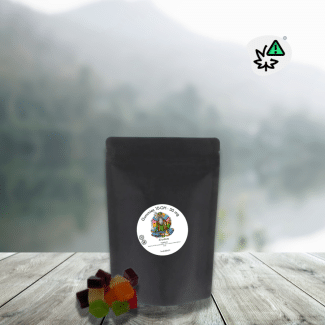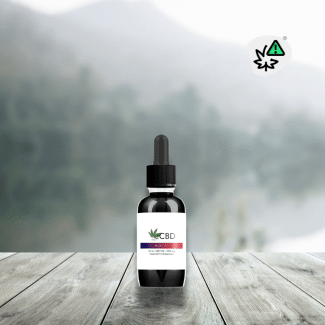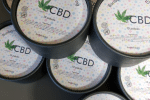
CBD (cannabidiol): a revolutionary food supplement?
The food supplement market is experiencing rapid expansion, and among the products that are most talked about, CBD (cannabidiol) occupies a special place. This natural compound, extracted from hemp, is renowned for its numerous virtues and arouses the interest of both consumers and health professionals. But can CBD really be considered a food supplement in its own right? What are its real effects on health? And how does it fit into a wellness-focused lifestyle? Here is a complete overview of the subject.
What is CBD?
Cannabidiol, commonly known as CBD, is one of the many cannabinoids found in the cannabis plant. Unlike THC (tetrahydrocannabinol), another well-known cannabinoid, CBD does not have psychoactive effects. In other words, it does not cause a feeling of "high" or euphoria, which makes it perfectly legal in many countries, including France, under certain conditions (in particular a THC level of less than 0.3%). .
CBD, a natural food supplement
The idea of integrating CBD into the food supplement category is based on several aspects. On the one hand, CBD is a natural compound, which meets the growing consumer demand for products of natural origin. On the other hand, its many potential health benefits make CBD an ideal candidate to supplement the daily diet.
Food supplements are products intended to provide nutritional or physiological benefit. They may contain vitamins, minerals, amino acids, plants or other substances. CBD, due to its anti-inflammatory, anxiolytic and antioxidant properties, can therefore be seen as a supplement aimed at improving general well-being.
The potential benefits of CBD
1. Reduced stress and anxiety
Stress is a modern illness that affects a large number of people. Many studies have shown that CBD has anxiolytic properties, meaning it can help reduce symptoms of anxiety. It works by interacting with serotonin receptors in the brain, a neurotransmitter responsible for regulating mood. As a food supplement, CBD could therefore help manage daily stress and promote better serenity.
2. Improved sleep
Restful sleep is essential to maintaining good health, both physical and mental. CBD is often used to improve sleep quality, especially in people with insomnia or sleep disorders related to anxiety or pain. By promoting deep relaxation, CBD can help regulate the sleep-wake cycle and allow for more peaceful rest.
3. Anti-inflammatory and analgesic properties
CBD is also known for its anti-inflammatory effects. These properties are particularly interesting for people suffering from chronic pain, such as arthritis or muscle pain. As a food supplement, CBD could therefore help reduce inflammation and relieve certain pain without resorting to traditional medications, which are often accompanied by unwanted side effects.
4. Antioxidant effect
Antioxidants are molecules that help protect the body against damage caused by free radicals, responsible for cellular aging and certain diseases. CBD has antioxidant properties that can help maintain cell health and strengthen the immune system. Integrated into a daily routine, CBD could therefore play a role in the prevention of diseases linked to oxidative stress.
CBD, a supplement suitable for everyone?
Although CBD has many potential benefits, it should be noted that its effects may vary from person to person. Some individuals may experience a significant improvement in their overall well-being, while others may not see immediate effects.
1. Caution for pregnant and breastfeeding women
As with any dietary supplement, pregnant or breastfeeding women are recommended to consult a healthcare professional before integrating CBD into their daily routine. As research into the effect of CBD on fetuses and infants is still limited, caution is advised.
2. Interactions with certain medications
CBD may also interact with certain medications , including those that affect liver enzymes. It is therefore essential to speak with a doctor before starting to consume CBD, especially if you are already taking medication.
The different forms of CBD available
CBD comes in several forms, making it easy to incorporate into your daily diet. Here are some of the most popular options:
1. CBD oil
CBD oil is one of the most common forms. It can be ingested directly under the tongue for rapid absorption or added to foods or drinks. This form is ideal for people who want to precisely adjust their CBD dosage.
2. Capsules and capsules
CBD softgels and offer a simple and discreet way to consume CBD. They allow easy and consistent dosing, and are perfect for those looking for regular supplementation.
3. CBD Infused Foods
More and more foods and drinks are infused with CBD , such as candies, chocolates, teas and even smoothies. This option is appreciated for its practicality and allows you to integrate CBD into your diet in a pleasant way.
4. CBD cosmetics and topicals
Although less directly related to dietary supplements, CBD cosmetics and topicals, such as creams and balms, allow CBD to be applied directly to the skin. They are often used to target specific areas of the body, especially in cases of muscle or joint pain.
The legal framework of CBD as a food supplement
In France, the legal framework surrounding CBD is still evolving. Although its sale is authorized as long as the THC level does not exceed 0.3%, authorities continue to carefully monitor this growing market. Currently, CBD can be sold in the form of oil, capsules or other edible products, but it is important to ensure that these products meet current quality and safety standards.
Consumers must therefore pay attention to the origin and quality of the products they buy. Organic labels, certifications and independent laboratory analyzes are all guarantees that ensure that the product is safe and effective.
CBD, a food supplement of the future?
With its many beneficial properties, CBD appears to be a promising dietary supplement for those looking to improve their well-being in a natural way. Although more research remains to be done to fully understand the extent of its effects, the initial results are encouraging.
As a food supplement, CBD offers an interesting alternative to traditional solutions for managing stress, chronic pain and even sleep disorders. However, as with any supplement, it is important to integrate it into an overall well-being approach, including a balanced diet, regular physical exercise and a healthy lifestyle.
Conclusion
CBD is undoubtedly a booming product in the field of dietary supplements. Its soothing, anti-inflammatory and antioxidant effects make it a potential ally for improving general well-being. However, it is crucial to stay informed and choose quality products, taking into account the recommendations of health professionals. Whether you are looking for a solution to better manage stress, improve your sleep or reduce chronic pain, CBD may well be the natural dietary supplement you need.
Ultimately, the growing popularity of CBD in the dietary supplement industry is not just a trend, but a sign that more and more people are seeking natural, holistic solutions to support their health and wellness. .

















